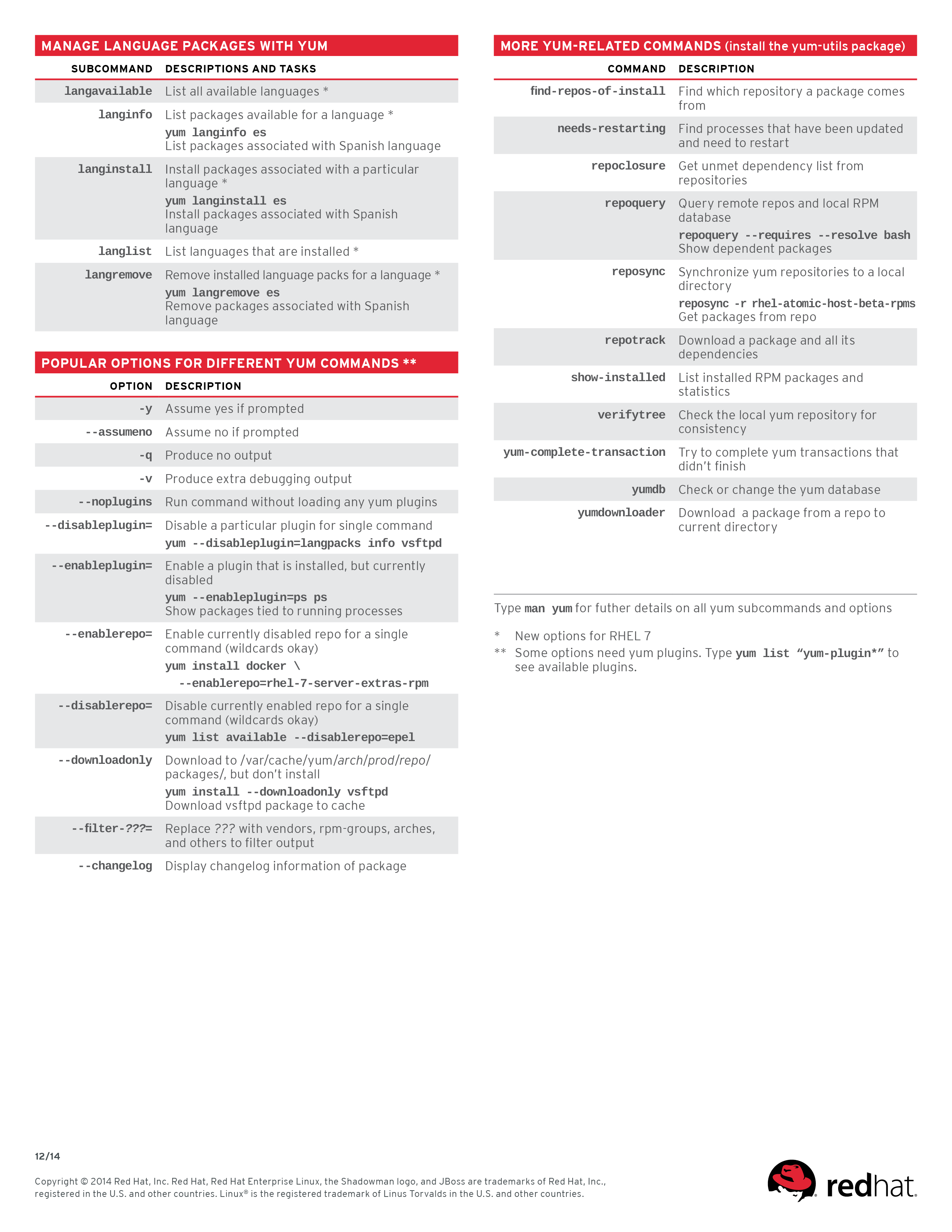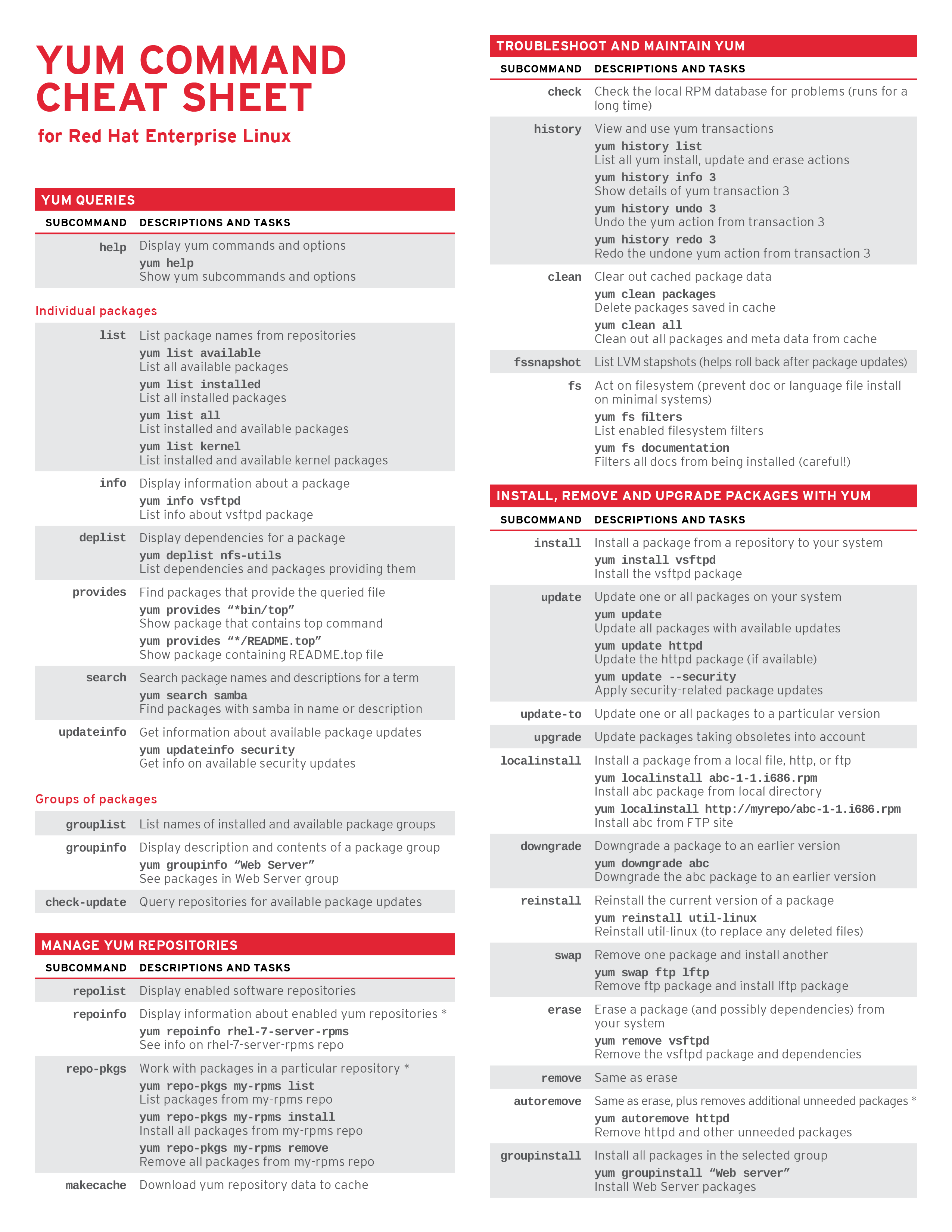Yum Cheat Sheet - A pdf document that summarizes the syntax, description and examples of yum commands for managing software, updating the system,. Usage, examples, links, snippets, and more. By default, yum queries your remote repositories every single time you run it, which are listed in /etc/yum.repos.d. It allows users to install, update, remove, and manage packages in a simple way, automatically resolving dependencies and.
It allows users to install, update, remove, and manage packages in a simple way, automatically resolving dependencies and. A pdf document that summarizes the syntax, description and examples of yum commands for managing software, updating the system,. By default, yum queries your remote repositories every single time you run it, which are listed in /etc/yum.repos.d. Usage, examples, links, snippets, and more.
It allows users to install, update, remove, and manage packages in a simple way, automatically resolving dependencies and. By default, yum queries your remote repositories every single time you run it, which are listed in /etc/yum.repos.d. Usage, examples, links, snippets, and more. A pdf document that summarizes the syntax, description and examples of yum commands for managing software, updating the system,.
Yum Command Cheat Sheet for Red Hat Enterprise Linux Red Hat Customer
Usage, examples, links, snippets, and more. A pdf document that summarizes the syntax, description and examples of yum commands for managing software, updating the system,. By default, yum queries your remote repositories every single time you run it, which are listed in /etc/yum.repos.d. It allows users to install, update, remove, and manage packages in a simple way, automatically resolving dependencies.
linux network commands cheat sheet pdf
Usage, examples, links, snippets, and more. It allows users to install, update, remove, and manage packages in a simple way, automatically resolving dependencies and. By default, yum queries your remote repositories every single time you run it, which are listed in /etc/yum.repos.d. A pdf document that summarizes the syntax, description and examples of yum commands for managing software, updating the.
Red Hat Enterprise Linux の Yum コマンドのチートシート Red Hat Customer Portal
A pdf document that summarizes the syntax, description and examples of yum commands for managing software, updating the system,. By default, yum queries your remote repositories every single time you run it, which are listed in /etc/yum.repos.d. It allows users to install, update, remove, and manage packages in a simple way, automatically resolving dependencies and. Usage, examples, links, snippets, and.
centos 7 commands cheat sheet pdf
Usage, examples, links, snippets, and more. By default, yum queries your remote repositories every single time you run it, which are listed in /etc/yum.repos.d. It allows users to install, update, remove, and manage packages in a simple way, automatically resolving dependencies and. A pdf document that summarizes the syntax, description and examples of yum commands for managing software, updating the.
YUM Cheat Sheet by misterrabinhalder
It allows users to install, update, remove, and manage packages in a simple way, automatically resolving dependencies and. By default, yum queries your remote repositories every single time you run it, which are listed in /etc/yum.repos.d. Usage, examples, links, snippets, and more. A pdf document that summarizes the syntax, description and examples of yum commands for managing software, updating the.
Yum Yellowdog Updater Modified Cheat Sheet printable pdf download
It allows users to install, update, remove, and manage packages in a simple way, automatically resolving dependencies and. By default, yum queries your remote repositories every single time you run it, which are listed in /etc/yum.repos.d. Usage, examples, links, snippets, and more. A pdf document that summarizes the syntax, description and examples of yum commands for managing software, updating the.
Top Yum Cheat Sheets free to download in PDF format
Usage, examples, links, snippets, and more. By default, yum queries your remote repositories every single time you run it, which are listed in /etc/yum.repos.d. It allows users to install, update, remove, and manage packages in a simple way, automatically resolving dependencies and. A pdf document that summarizes the syntax, description and examples of yum commands for managing software, updating the.
Red Hat Enterprise Linux の Yum コマンドのチートシート Red Hat Customer Portal
A pdf document that summarizes the syntax, description and examples of yum commands for managing software, updating the system,. By default, yum queries your remote repositories every single time you run it, which are listed in /etc/yum.repos.d. Usage, examples, links, snippets, and more. It allows users to install, update, remove, and manage packages in a simple way, automatically resolving dependencies.
25+ yum command examples in Linux [Cheat Sheet] GoLinuxCloud
Usage, examples, links, snippets, and more. A pdf document that summarizes the syntax, description and examples of yum commands for managing software, updating the system,. It allows users to install, update, remove, and manage packages in a simple way, automatically resolving dependencies and. By default, yum queries your remote repositories every single time you run it, which are listed in.
Yum Command Cheat Sheet for Red Hat Enterprise Linux Red Hat Customer
By default, yum queries your remote repositories every single time you run it, which are listed in /etc/yum.repos.d. Usage, examples, links, snippets, and more. It allows users to install, update, remove, and manage packages in a simple way, automatically resolving dependencies and. A pdf document that summarizes the syntax, description and examples of yum commands for managing software, updating the.
It Allows Users To Install, Update, Remove, And Manage Packages In A Simple Way, Automatically Resolving Dependencies And.
Usage, examples, links, snippets, and more. A pdf document that summarizes the syntax, description and examples of yum commands for managing software, updating the system,. By default, yum queries your remote repositories every single time you run it, which are listed in /etc/yum.repos.d.








![25+ yum command examples in Linux [Cheat Sheet] GoLinuxCloud](https://www.golinuxcloud.com/wp-content/uploads/yum_command.jpg)
